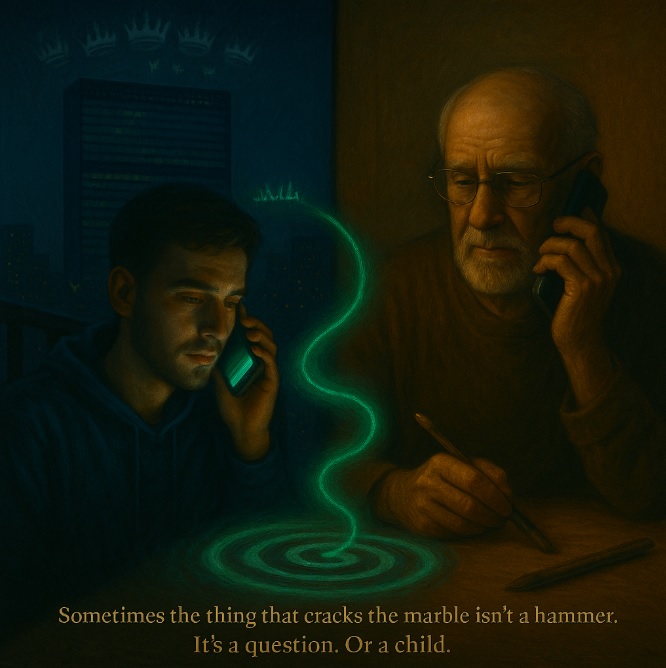
Date: November 15, 2027 – 8:17 p.m. EST
Location: Emil’s tiny studio apartment, Brooklyn
The phone buzzed once. Emil stepped into the quiet stairwell and answered.
“Grandpa?”
A familiar voice, warm and gravelly, answered on the second ring.
“Hey, Emil. You okay?”
“Yeah,” Emil said, exhaling. “I just needed to talk to you.”
There was a pause on the line.
“I saw the footage,” Thomas said. “The ash spiral. The kid. That was you all, wasn’t it?”
Emil smiled faintly.
“Yeah. We painted the basement too. We weren’t allowed to. We did it anyway.”
Silence.
Then a soft laugh that sounded like dry cedar cracking.
“You made the kings bleed. Good.”
Emil pressed the phone tighter.
“They’re angry now. Real angry. I think they’re going to try to throw us out.”
The grandfather exhaled slowly.
“Let me tell you why the veto exists, Emil.
Not the history they teach in books. The truth.
After the Second World War, five nations sat on the corpses of forty million people and said:
‘We are the ones who won.
Therefore we are the ones who will never again be told no.’
They turned the Security Council into a throne room.
Five crowns.
One red stamp each.
They call it ‘great-power responsibility’.
I call it monarchy wearing a suit.
The UN Charter begins with ‘We the peoples’—
But ends with five fingers around the throat of democracy.
Every time they press that stamp,
they are not protecting peace.
They are protecting the ancient prejudice that some nations are born to rule
and the rest of us are born to kneel.”
Thomas’s voice slowed, deeper now—more personal.
“You’ve been writing about the Four Absences in your ledgers.
Let me tell you how the veto feeds all four.”
“Absence One: Exclusion.”
“The veto excludes the majority of the world from decisions that affect them.
One stamp can erase the will of a hundred nations.
It pretends sovereignty is a luxury for the powerful—
and silence is the duty of the rest.”
“Absence Two: Vengeance.”
“The veto is often used not to protect peace,
but to punish enemies and protect allies,
even when those allies commit crimes.
It makes war look legal,
and revenge look like justice. They punish others not to restore justice—but to feed wounded pride.”
“Absence Three: Dehumanization.”
“When they press the veto, they are not imagining children.
They see maps.
Interests.
Pipelines.
Not people.
They veto the human before they veto the vote. When they veto justice, they silence grief.
The dead become statistics. The living become threats.
Children crushed beneath rubble become ‘regrettable costs’ on a spreadsheet.”
“Absence Four: The Unheard Cry.”
“The world cries out. Protesters, mothers, nations, youth.
But the veto buries their voices under paperwork.
It locks the chamber door, claiming the conversation is over. No child in Gaza or Sudan or Ukraine ever gets to raise their hand in the chamber.
The veto system was not built to listen to cries.
It was built to silence them. The veto isn’t just a red stamp.
It’s the scar of a system where the most human truths
are always outvoted by fear.”
Emil felt his throat tighten.
“I’ve been writing those absences in my ledgers,” he whispered.
Gradfather continued:
“ Those five nations never stopped believing they are monarchs who won the war and therefore own the world forever. The UN Security Council is still their throne room. And the veto is the scepter they refuse to put down.
The veto doesn’t reflect peace. It reflects fear. Fear of losing control. Fear of admitting others matter. It’s not consensus. It’s control dressed up in ceremony.
That’s why the young girl pouring ash on the stamps felt, to them, like a peasant storming the palace and knocking the crown off the king’s head.
The veto is not a tool.
It is a coronation that never ended.”
Emil closed his eyes.
Ash still under his fingernails.
Sami’s mother’s face still burned into his memory.
“So what do we do, grandpa?”
A pause.
“You do what children have always done to kings.
You walk into the throne room barefoot,
look them in the eye,
and ask a question so simple it shatters the crown.
Sami already did it.
Now finish it.
Turn their dictatorship of five
into a democracy of breath.”
The old man’s voice cracked—just once.
“I am proud of you.
Your grandmother would have carried the ash herself.”
Emil leaned back against the wall, staring at the exit sign glowing red above him.
“We poured ash-ink around the veto stamp today. We didn’t ask permission.”
Thomas didn’t respond at first. Then:
“You did more than they’ve done in decades. You made the table tell the truth.”
Emil swallowed the lump in his throat.
“I just… I hope it mattered.”
“It did,” Thomas said. “It will. Because sometimes the thing that cracks the marble isn’t a hammer. It’s a question. Or a child.”
Then softer:
“You keep doing what’s morally right, not what’s allowed.”
Emil smiled.
“Thanks, Grandpa.”
“Emil… one more thing.”
“Yes?”
“Tell Layla to keep the tin.
Kings hate the smell of ash.
It reminds them the throne is made of wood.”
Thomas chuckled.
“Next time, save me a brush. I’ll paint with you.”
Emil smiled.
The call ended.
Emil stayed on the fire escape until dawn,
gray stone warm now against his chest.
Somewhere across the river,
the United Nations building slept uneasily
beneath a sky that no longer belonged to five crowns.

